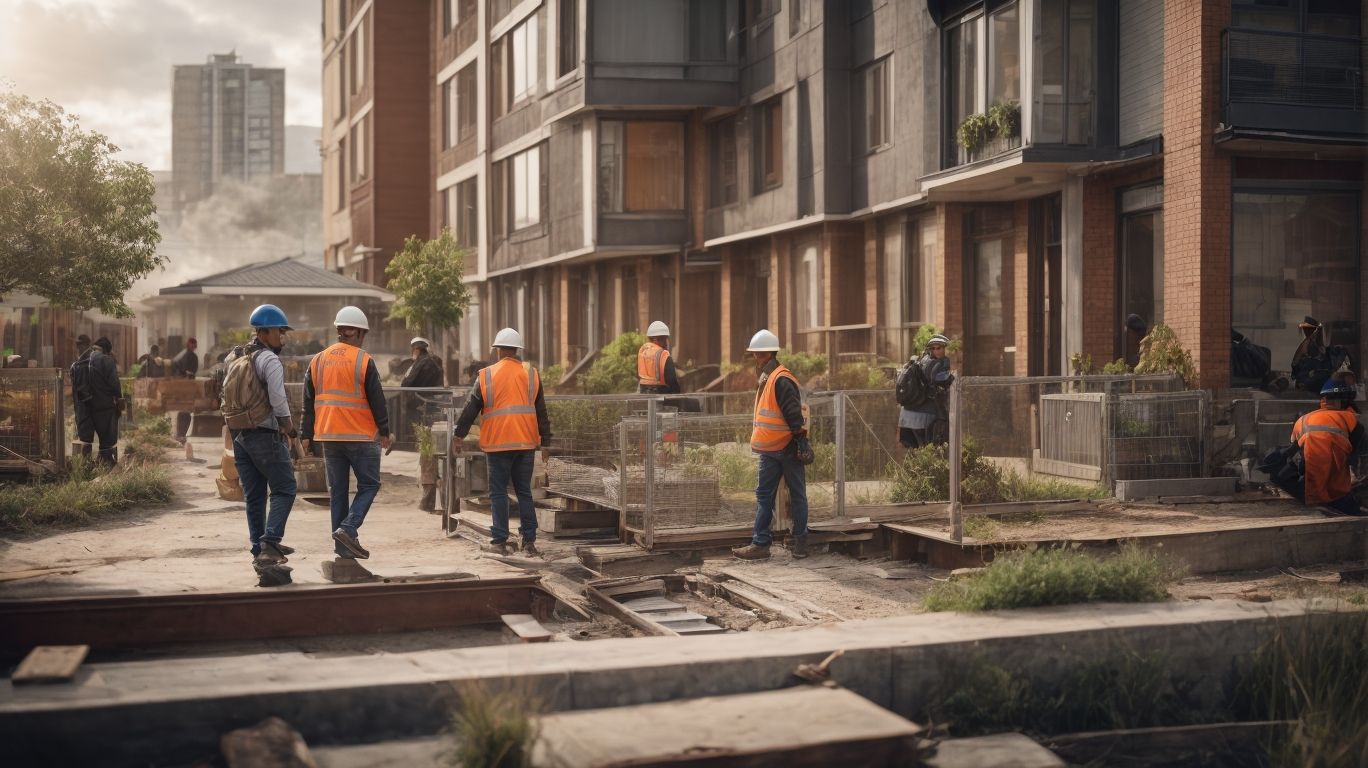
Legal and regulatory issues can be a major hurdle for property developers looking to bring their projects to fruition. With complex laws and constantly changing regulations, it can be overwhelming for developers to stay on top of everything. In this article, we’ll explore some key strategies and tips that can help you navigate these challenges and successfully navigate the legal and regulatory landscape. By reading this, you can gain a better understanding of how to handle these issues and achieve your development goals.
What Are Legal and Regulatory Issues for Property Developers?
Property developers face a range of legal and regulatory issues throughout their projects, including:
- zoning and land use regulations
- building codes and permits
- environmental regulations
- contract disputes
- compliance with fair housing laws
These regulations determine how properties can be developed and used, ensure construction meets safety standards, protect natural resources, and ensure equal access to housing opportunities. Successfully navigating these issues is crucial for ensuring the legality and success of development projects.
What Are the Common Legal Issues for Property Developers?
Property developers often face a variety of legal issues, including disputes over land ownership, breach of contract claims, zoning and land use restrictions, compliance with environmental regulations, and adherence to building codes. These challenges can arise at any stage of the development process, whether it be during land acquisition, contract negotiations, or construction. It is crucial for property developers to have a thorough understanding of these legal matters in order to mitigate risks and ensure compliance. Seeking legal counsel, conducting due diligence, and staying informed about relevant laws and regulations are crucial steps to successfully navigate these obstacles. Failure to address these legal issues properly can lead to penalties, project delays, and damage to one’s reputation.
What Are the Common Regulatory Issues for Property Developers?
Common regulatory issues that property developers may face include:
- Zoning and land use regulations, building codes and safety regulations, and obtaining necessary permits and licenses.
Zoning and land use regulations dictate the acceptable uses and development of properties, while building codes ensure that structures meet safety standards. Obtaining permits and licenses is crucial for legal compliance.
Failure to navigate these regulatory issues properly can result in legal penalties, delays, and increased costs, as well as damage to reputation and future business opportunities.
To stay informed about regulatory changes, property developers should regularly review laws and regulations, attend relevant industry conferences and seminars, seek guidance from legal professionals, and join industry associations and networks.
What Are the Steps to Navigate Legal and Regulatory Issues as a Property Developer?
As a property developer, navigating the legal and regulatory landscape can be a daunting task. However, by following a series of essential steps, you can ensure that your development project complies with all necessary laws and regulations. In this section, we will discuss the crucial steps that property developers must take to successfully navigate legal and regulatory issues. From conducting due diligence to seeking legal advice and representation, we will cover the key strategies for ensuring a smooth and compliant development process.
1. Conduct Due Diligence
Conducting due diligence is a crucial step for property developers to effectively navigate legal and regulatory issues. This process involves thorough research and investigation before beginning any property development project. Here are the steps to properly conduct due diligence:
- Research property ownership and boundaries.
- Review zoning and land use regulations.
- Examine environmental factors and potential hazards.
- Assess any existing legal disputes or liens on the property.
- Check for compliance with building codes and safety regulations.
- Verify permits and licenses required for the development.
True story: A property developer failed to conduct due diligence and purchased a property without realizing it had a historical preservation designation. This mistake resulted in delays, legal battles, and significant financial losses. Properly conducting due diligence could have prevented this costly error.
2. Obtain Necessary Permits and Licenses
Obtaining necessary permits and licenses is a crucial step for property developers to ensure compliance with legal and regulatory requirements.
- Identify the specific permits and licenses required for your development project.
- Research the application process and gather the required documentation.
- Complete and submit the necessary applications along with any required fees.
- Engage with relevant authorities and promptly respond to any inquiries or requests for additional information.
- Adhere to any conditions or restrictions imposed by the permits or licenses.
3. Comply with Zoning and Land Use Regulations
Property developers must adhere to zoning and land use regulations to ensure they are in compliance with legal and regulatory standards. Here are the essential steps to effectively navigate these issues:
- Conduct thorough research and gain an understanding of local zoning laws and regulations.
- Identify the specific zoning requirements for the intended development project.
- Review the land use regulations for the area to determine if the project aligns with the designated land use.
- Apply for the necessary permits and approvals related to zoning and land use.
- Prepare and submit all required documents and plans to demonstrate compliance with regulations.
- Maintain open communication with local authorities to address any questions or concerns.
- Make any necessary adjustments to the project design to comply with zoning and land use regulations.
To stay updated on any legal and regulatory changes:
- Regularly review updates to zoning and land use regulations.
- Attend industry conferences and seminars to stay informed about changes and best practices.
- Consult with legal professionals to ensure compliance and receive guidance on navigating complex issues.
- Join industry associations and networks to stay informed and collaborate with peers.
By following these steps and staying informed, property developers can effectively navigate zoning and land use regulations.
4. Adhere to Building Codes and Safety Regulations
Adhering to building codes and safety regulations is crucial for property developers to ensure the legality and safety of their projects. To achieve this, developers should follow these steps:
- Research and understand local building codes and safety regulations to ensure compliance.
- Hire qualified professionals, such as architects and engineers, to ensure that the project meets all necessary standards.
- Create detailed plans and specifications that adhere to code requirements.
- Obtain all necessary permits and approvals before beginning construction.
- Regularly inspect the construction site to ensure that all regulations are being followed during the building process.
- Implement safety measures, such as proper signage and safety equipment, to protect workers and the public.
- Conduct regular quality checks to ensure that all materials and construction methods meet standards.
- Maintain accurate records of compliance and inspections throughout the project to ensure accountability.
5. Seek Legal Advice and Representation
When navigating legal and regulatory issues as a property developer, it is crucial to seek legal advice and representation. This step is essential in ensuring compliance, protecting your interests, and mitigating potential risks. Here are some important considerations to keep in mind when seeking legal advice and representation:
- Research and identify experienced real estate attorneys who specialize in property development.
- Consult with multiple attorneys to find the best fit for your specific needs.
- Clearly communicate your goals and concerns to the attorney to ensure they understand your requirements.
- Work closely with the attorney to develop a comprehensive legal strategy that aligns with your objectives.
- Maintain open and regular communication with your attorney to stay informed of any legal updates or changes.
What Are the Consequences of Not Navigating Legal and Regulatory Issues Properly?
When it comes to property development, navigating legal and regulatory issues is crucial for success. Failure to do so can result in serious consequences for developers. In this section, we will explore the potential outcomes of not properly addressing legal and regulatory issues. From legal penalties and fines to delays and damage to reputation, we will discuss the various ways in which overlooking these issues can have a negative impact on a property developer’s business.
1. Legal Penalties and Fines
Legal penalties and fines can have serious consequences for property developers who do not comply with legal and regulatory requirements. To effectively navigate this issue, property developers should follow these steps:
- Conduct thorough research to fully understand all applicable laws and regulations.
- Engage legal professionals to ensure compliance with all legal requirements.
- Obtain all necessary permits and licenses before starting any development activities.
- Adhere strictly to zoning and land use regulations to avoid any legal complications.
- Ensure compliance with building codes and safety regulations to prioritize the well-being of occupants.
One real-life example that highlights the importance of properly navigating legal and regulatory issues involves a property developer who began construction without obtaining the required permits. As a result, they faced hefty fines, legal battles, and delays in completing the project. This not only resulted in financial losses but also damaged their reputation, leading to missed future business opportunities. By diligently navigating legal and regulatory issues, property developers can avoid such pitfalls and ensure successful projects.
2. Delays and Cost Overruns
Delays and cost overruns can have a significant impact on property development projects. To effectively navigate these challenges, property developers should consider the following steps:
- Develop a comprehensive project plan that includes realistic timelines and budget estimates.
- Conduct thorough research and due diligence to identify potential obstacles and risks, mitigating the impact of delays and cost overruns.
- Regularly communicate and collaborate with all stakeholders, including contractors, suppliers, and local authorities, to address any issues that may arise.
- Maintain a proactive approach to project management, promptly and efficiently addressing any issues that may arise.
- Implement effective cost control measures, such as regular budget monitoring and risk assessment, to prevent delays and cost overruns.
- Establish clear contractual agreements with contractors, ensuring that responsibilities and timelines are clearly defined to avoid potential delays and cost overruns.
By following these steps, property developers can mitigate the impact of delays and cost overruns, allowing for smoother project execution and increased profitability.
3. Damage to Reputation and Future Business Opportunities
Damage to reputation and future business opportunities can be a result of not properly navigating legal and regulatory issues as a property developer. To mitigate these risks, developers should consider taking the following steps:
- Adhere to ethical business practices and maintain transparency in all dealings.
- Ensure compliance with all applicable laws and regulations.
- Develop a strong public relations strategy to effectively manage any negative incidents or controversies.
- Build and maintain positive relationships with all stakeholders, including government agencies and local communities.
- Implement effective risk management and crisis response plans to address any potential legal or regulatory issues.
By following these steps, property developers can protect their reputation and maximize future business opportunities. It is crucial to prioritize compliance with legal and regulatory requirements to ensure long-term success in the industry.
How Can Property Developers Stay Up-to-Date on Legal and Regulatory Changes?
As a property developer, staying informed about the constantly evolving legal and regulatory landscape is crucial for success. In this section, we will discuss the various ways in which property developers can stay up-to-date on these changes. From regularly reviewing laws and regulations to consulting with legal professionals, we will explore the different strategies that can help developers navigate potential legal and regulatory issues. Additionally, we will highlight the benefits of attending industry conferences and seminars, as well as joining industry associations and networks.
1. Regularly Review Laws and Regulations
Regularly reviewing laws and regulations is essential for property developers to remain compliant and minimize legal risks. Follow these steps to ensure you are staying up-to-date:
- Stay informed: Keep yourself updated with any changes in local, state, and federal laws and regulations related to property development.
- Research: Conduct thorough research to understand the specific legal requirements and obligations in your area.
- Seek professional advice: It is crucial to consult with legal professionals who specialize in real estate and property development to ensure compliance.
- Network and collaborate: Join industry associations and networks to stay connected with peers and gain insights into changing regulations.
Remember, staying informed about laws and regulations is an ongoing process. Continuously review and adapt your practices to avoid potential legal issues and maintain a successful property development business.
2. Attend Industry Conferences and Seminars
It is essential for property developers to attend industry conferences and seminars in order to stay informed and effectively navigate legal and regulatory issues.
- Stay updated: Conferences and seminars offer valuable insights into the latest legal and regulatory changes that impact the industry.
- Networking opportunities: These events provide a platform to connect with experts, legal professionals, and fellow developers, promoting knowledge sharing and collaboration.
- Access to expertise: Workshops and panels led by industry leaders at conferences and seminars offer guidance on specific legal and regulatory challenges.
- Learning from case studies: Real-life examples shared during these events can provide practical strategies for successfully managing legal and regulatory issues.
3. Consult with Legal Professionals
Consulting with legal professionals is crucial for property developers to navigate legal and regulatory issues effectively. Here are important steps to consider when seeking advice from legal professionals:
- Research: Conduct thorough research to find experienced lawyers specializing in real estate and property development.
- Initial Consultation: Schedule an initial consultation with the chosen legal professional to discuss your project and understand their expertise.
- Legal Assessment: Engage the lawyer to conduct a comprehensive legal assessment of your project, including reviewing contracts and agreements.
- Risk Mitigation: Work with the legal professional to identify potential legal risks and develop strategies to mitigate them.
- Compliance: Ensure compliance with all applicable laws, regulations, and permits, with the guidance of the legal professional.
By following these steps, property developers can benefit from the expertise and guidance of legal professionals, minimizing legal risks and ensuring a smoother development process.
4. Join Industry Associations and Networks
Joining industry associations and networks is a crucial step for property developers to effectively navigate legal and regulatory issues.
- Access to resources: Associations provide valuable resources such as industry guidelines, best practices, and updates on regulatory changes.
- Networking opportunities: Connecting with peers and professionals in the industry can lead to valuable insights, advice, and potential partnerships.
- Advocacy and representation: Associations advocate for the interests of property developers, ensuring their voices are heard in the development of regulations and policies.
- Education and training: Associations often offer seminars, workshops, and educational programs to help developers stay updated on industry trends and legal requirements.
True story: A developer faced a complex legal issue related to zoning regulations. Through their industry association, they were able to connect with a lawyer experienced in the specific area of law and successfully navigate the issue, saving time and resources.








